The Effect of Mediation Program on Emotion Quotient of the First Year Nursing Students in Phetchaburi Rajabhat University
Keywords:
meditation program, emotion quotient, nursing studentsAbstract
This research was a quasi-experiment with one-group pretest-posttest design. The purpose of this research was to study the effect of meditation program in promoting emotional quotient of the first year Nursing Students in Phetchaburi Rajabhat University by comparison mean pretest-posttest scores. This program based on the Observational learning’s concept process which based on social cognitive learning theory of Bandura were used as the conceptual frameworks to develop the program. The study sample consisted of 64 first year nursing students in Phetchaburi Rajabhat University. The research tool was the meditation program, which tested to ensure content validity by a panel of five experts before their implementation. Emotional Intelligence Assessment2 was used to collect data at three time points: pre-test, post-test, and at one-month follow up. The reliability of the questionnaires was confirmed with Cronbach’s alpha coefficients at .89. Data were analyzed using Repeated Measure Analysis of Variance and Bonferroni’s statistic.
The findings of the study revealed that the study sample’s mean post- test scores of emotional quotient obtained immediately after the experiment and at one-month follow up were statistically significantly higher than the mean pre-test score (p <.05).
Downloads
References
Bandura A. Social foundations of thought and action: Asocial cognitive theory. New Jersey: Prentice-Hall; 1986.
Mental Health Division. Manual of emotional quotient. Bangkok: Ministry of Public Health; 2003.
Sricamsuk AS, Voraharn W, Senarak W. Happiness of undergraduate nursing students, faculty of Nursing, Khon Kaen University. Journal of Nursing Science & Health. 2011;34(2):70-79. (in Thai)
Photong P, Pumphung S, Khachat S. Stress, Adaptation, and Emotional Intelligence among the First Year Nursing Students. Journal of Phrapokklao Nursing College. 2011;22(2):1-14. (in Thai)
Kaewsakulthong J. Factors predicting stress among nursing students under the Praboromarajchanok Institute, Ministry of Public Health. Journal of Health Research and Innovation. 2019;2(1):1-7. (in Thai)
Woraphongphichet P. Brain Development with Mindfulness. Dhamma and Life. 2013; 13(151):58-61. (in Thai)
Puangmali N, Nontapa R, Foosang S. The four focuses insight meditation practice for human resource development. E-Journal, Silpakorn University. 2019;11(1):1588-1604. (in Thai)
Punnittamai W. Emotional Quotient: Happy and Success Index. Bangkok: Chulalongkorn University Press, 2011. (in Thai)
Goleman D. Working with Emotional Intelligence. NewYork: Bantam Books; 1998.
Lertsakornsiri M. The effectiveness of meditation program toward multiple intelligences among the first year students at Saint Louis College. Journal of The Royal Thai Army Nurses. 2016; 17(3):44-3. (in Thai)
Dunlop J. Meditation, stress relief, and well-being. Radiologic Technology. 2015;86(5):535-555.
Silpakit O. Neuroscience study in mindfulness meditation. Journal of Mental Health of Thailand. 2012;20(1):46-56. (in Thai)
Treadway MT, Lazar SW. The neurobiology of mindfulness. In: Didonna F, editor. Clinical handbook of mindfulness. New York: Springer; 2009.
Bamber MD, Schneider JK. Mindfulness-based meditation to decrease stress and anxiety in college students: A narrative synthesis of the research. Educational Research Review. 2016;18: 1-32.
Charoensukmongkol P. Benefits of mindfulness meditation on emotional intelligence, general self-efficacy and perceived stress: Evidence from Thailand. Journal of Spirituality in Mental Health. 2014;16:171-192.
Onduang N, Phuphaibul R, Kongsaktrakul C. The Effects of Health Skill Training Program Using Cartoon Bookson Health Behavior Among Grade Five Students. Graduate Research Conferrene. 2012: 616-625. (in Thai)
Photaworn P, Wongpradit S. Effect of a Breathing Meditation Program Using Video Media on Nursing Students’ Stress during the Post Test of the Maternal-Newborn and Midwifery 2 Practicum. Nursing Journal of the Ministry of Public Health. 2017;27(1):126-134. (in Thai)
Suphunpasuch A. Develop EQ with music. Bangkok: Mahachulalongkornrajavidyalaya; 2002. (in Thai)
Jadhav YV, Manthalkar R, Joshi N. Effect of meditation on emotional response: An EEG-based study. Biomedical Signal Processing and Control. 2017;34:101-113
Downloads
Published
How to Cite
Issue
Section
License
บทความหรือข้อคิดเห็นใดใดที่ปรากฏในวารสารพยาบาลทหารบกเป็นวรรณกรรมของผู้เขียน ซึ่งบรรณาธิการหรือสมาคมพยาบาลทหารบก ไม่จำเป็นต้องเห็นด้วย
บทความที่ได้รับการตีพิมพ์เป็นลิขสิทธิ์ของวารสารพยาบาลทหารบก
The ideas and opinions expressed in the Journal of The Royal Thai Army Nurses are those of the authors and not necessarily those
of the editor or Royal Thai Army Nurses Association.






